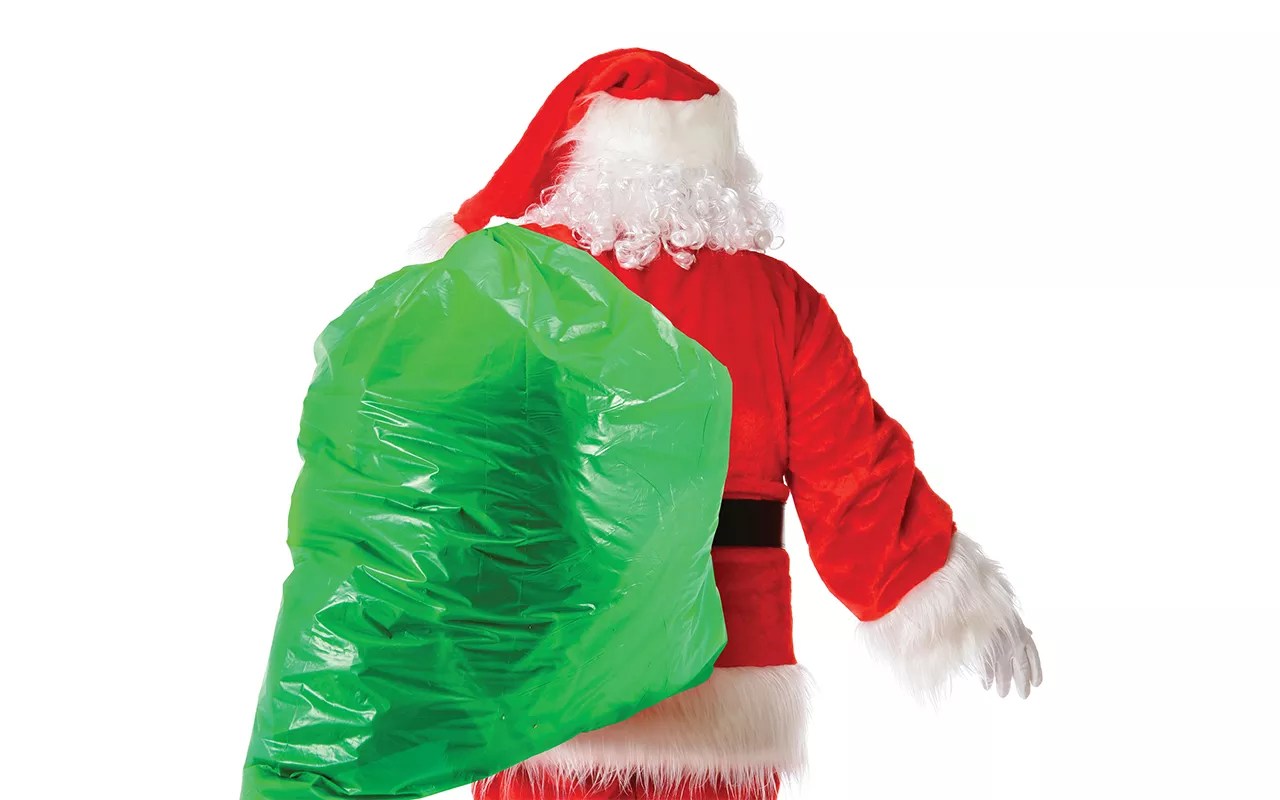
Getty Images/Westword Photo Illustration

Audio By Carbonatix
Compost Colorado sits just north of the I-70/I-25 interchange, where the South Platte River squeezes beneath the state’s two largest highways, in a historic neighborhood at the nexus of environmental and economic justice in Denver. Globeville got its name in the 1880s from one of the many smelting companies that hugged the banks of the Platte, burning ore from the mountains to produce valuable minerals – and polluting large swaths of the air and earth in a mostly immigrant community over a compounding century. Today, its zip code is still considered one of the most polluted areas in the country.
I drive north, fighting the morning rush of work vehicles down a neglected stretch of Washington Street, between warehouses, barbed wire fences and scrapyards, and pull in to an old slaughterhouse that looks abandoned but for the bins that line its outer wall. I’m here for my weekly shift driving a compost pickup. I walk between the makeshift office and the zero-waste store to the warehouse. I sign in. A day collecting the city’s leftovers begins.

Compost Colorado occupies an old packinghouse in Globeville.
Noah Kaplan
Compost Colorado, or CoCo, was founded in 2019 by Vann Fussell, who will tell you that “soil is the foundation for life.” Composting, the natural process by which organic matter breaks down into its basic nutrients and microbes, makes all life possible. Plants and animals die, and the organic matter decays and is reclaimed by soil, fueling microbes that digest carbon in the atmosphere and nutrients that allow new life to spring up. Healthy soil also means better water retention for communities that experience drought, and better water filtration that helps keep groundwater clean.
Our food and waste systems have taken a lot out of the earth and returned very little.
Fussell, a fully activated environmentalist, and his team salvage over two million pounds of organic waste a year, offering a growing list of 2,000-plus businesses and homes that sustainable living made easy. CoCo is unique in the world of compost haulers in Colorado in that it offers a circular economy experience, complete with a weekly organic waste pickup and simultaneous delivery of local eco-friendly products placed in a clean, returnable bucket, eliminating excess packaging. A spring delivery of living soil completes the waste loop – nourishing yards, parks and gardens in the metro area that clean the air, cultivate green space and act as one of the most effective carbon-capture technologies at our fingertips, packing organic carbons that would otherwise end up in the atmosphere back where they belong, into the soil.
“If you can do that on thousands and tens of thousands and millions of acres, that can make a huge impact on the planet,” says Fussell.
I greet the other drivers I see every week. We are all the kind of people who don’t mind a day alone, listening to music, singing along with Phish and moving quickly throughout Denver’s varied neighborhoods – making one stop on this block, one on that; going through roundabouts and turning around in cul-de-sacs; stopping for coffee and struggling with a few hundred pounds of coffee grounds from the Starbucks on our route. Nine to ten hours of driving, hauling, dumping and cleaning out five-gallon buckets of up to thirty pounds of organic material at a time, up to 150 times a day.
I grab the keys to my Mercedes Sprinter and look at my orders. Two new households. One new apartment, third floor – shit. Hand-soap starter kit. Another Starbucks: That’s going to kill my time. I fill organic soap bottles from big refillable drums that we use to deliver zero-waste multi-purpose soaps and detergents acquired from a local company, Boulder Clean, in returnable and reusable containers. While we get organized, the drivers make the small talk of colleagues readying for work: the occasional angry dog story, the rancid bucket and more surprising finds, and all the dramas and comedies of being out on the road all day. But we don’t waste much time. The sooner I start, the sooner I finish my 128 stops and 98.4 miles around the foothills. I will return with a desensitized sense of smell and nearly 2,000 pounds of compostable material that would otherwise go to a landfill.
“Landfills are bad news bears,” Fussell says, “and over 40 percent of our municipal landfill in Denver is compostable material.”
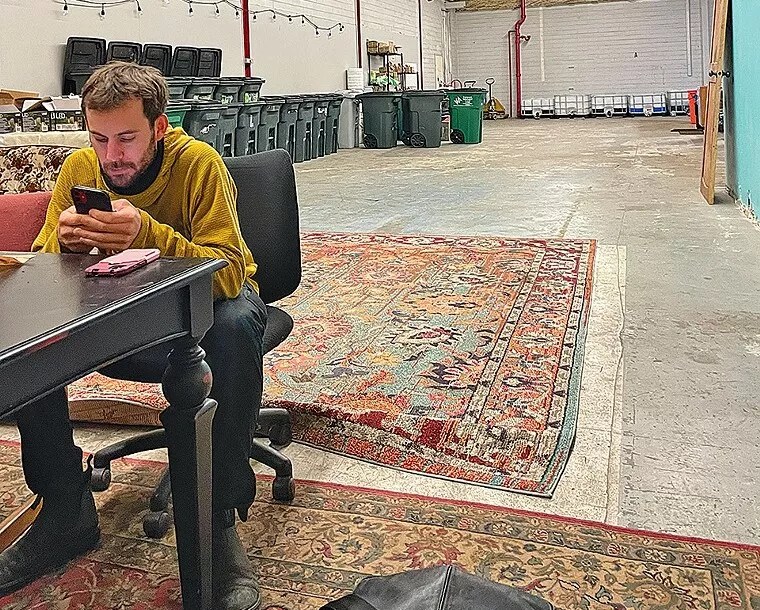
Vann Fussell at work in the Compost Colorado warehouse.
Noah Kaplan
Which is pretty bad, but it gets worse.
Across the world, trapped between Styrofoam and plastics, organic waste is incapable of properly breaking down without oxygen. “This produces huge amounts of methane gas, 84 times more heat-trapping than carbon dioxide,” Fussell notes, which is why food waste is one of the greatest contributors to local and global greenhouse gas emissions and climate change. The Washington Post recently reported that the greenhouse gas emissions of food waste are currently greater than those of the airline industry.
That’s a big deal, and a big problem to solve for allegedly progressive and eco-friendly cities like Denver, which ranks among the worst in organics diversion.
In 2008, a study by Denver’s Department of Solid Waste Management found that the city had an abysmal track record on landfill diversion. Denver barely recycled a tenth of its solid waste, and “that diversion of yard and food wastes, which constituted 48 percent of the residential waste stream sampled, have the greatest potential for decreasing landfilled materials,” according to the department’s report. In response, the city approved the 2010 Master Plan for Solid Waste Management to address concerns about diversion.
Since then, some progress has been made. Denver reduced landfill waste by 300 pounds on average per household per year. Instead of dumpsters, every household got recycling and trash bins, and some signed up for composting carts, increasing composting from 1,600 homes in 2010 to over 30,000 homes in 2022. But today there are 150,000 residents and businesses without composting service, and Denver still ranks low for waste diversion when compared to other cities around the country. Last year, the city diverted 26 percent of its municipal solid waste away from the landfill, well below the national average of 34 percent.
The thing is, trash is cheap here: It costs the Denver consumer nothing to throw away most things, an expense covered by the city’s general fund. But that all changes in January. In April, Denver City Council made the first update to the 2010 Solid Waste Management Plan, signing into law the Sustainable Resource Management Plan, which incorporates measures including the Expanded Waste Services program known as Pay as You Throw.
To close the carbon loop that dead-ends at the landfill, city officials are changing the economic incentive used to encourage waste diversion. Starting with the new year, the city will charge residents for the amount of trash they send to landfills, providing free, weekly recycling and compost services and doubling the number of recycling and composting routes a month. The more you send to the landfill, the more you pay.
“Even accounting for Denver’s future growth, achieving a 50 percent diversion rate will reduce greenhouse gas emissions by the equivalent of taking over 600,000 cars off the road,” the plan notes. It’s a reminder for those screaming from the ballot box, or quietly muttering, in fits of solastalgia – climate anxiety we mostly suffer alone – that waste diversion is an accessible and massive step. And Denver residents are waking up to at least their theoretical desire to see waste managed differently.

A compost bucket from a Compost Colorado route.
Noah Kaplan
In November, Denver voters overwhelmingly approved Initiative 306, Waste No More, an ordinance requiring that recycling and composting services be offered in businesses and apartments, which the city has been notoriously slow to supply. With public opinion and policy possibly aligning in 2023, CoCo’s moment may just be ripening – like a compost bucket in the afternoon sun.
But is the city ready? City Auditor Tim O’Brien had his crew check out Denver’s waste diversion program and reported in November that the rollout of the Sustainable Resource Management Plan may be headed for disaster. “I want to see the policy succeed,” says O’Brien, “but the audit found Denver has no strategic plan [and] is short 20 percent of their driving force.” In addition, 60 percent of the city’s service trucks are old and close to decommissioning.
Despite the auditor’s warning, the Department of Transportation & Infrastructure, which is tasked with administering the plan, believes that it’s ready. According to Vanessa Lacayo, a DOTI spokesperson, O’Brien’s numbers are outdated. “We have filled 98 percent of all vacant positions,” she says. Additional investment allowed for a $5,000 hiring bonus, and a reclassification of the driving positions created better pay.
If Denver is betting big on tripling or even quadrupling its composting volume in the coming years to meet climate goals, however, it’s going to need tens of thousands of additional composting clients and drivers collecting hundreds of thousands of pounds of compost daily. That will require a huge investment in waste management, and the city has already poured $3.8 million into education initiatives, to teach composting in the community. “This isn’t happening overnight,” Lacayo notes. “We have 150,000 people without composting service.”
With both Pay as You Throw and Waste No More taking effect in 2023, there will certainly be more waste collected. What is Denver going to do with it?
“We’ll take it,” Fussell says.
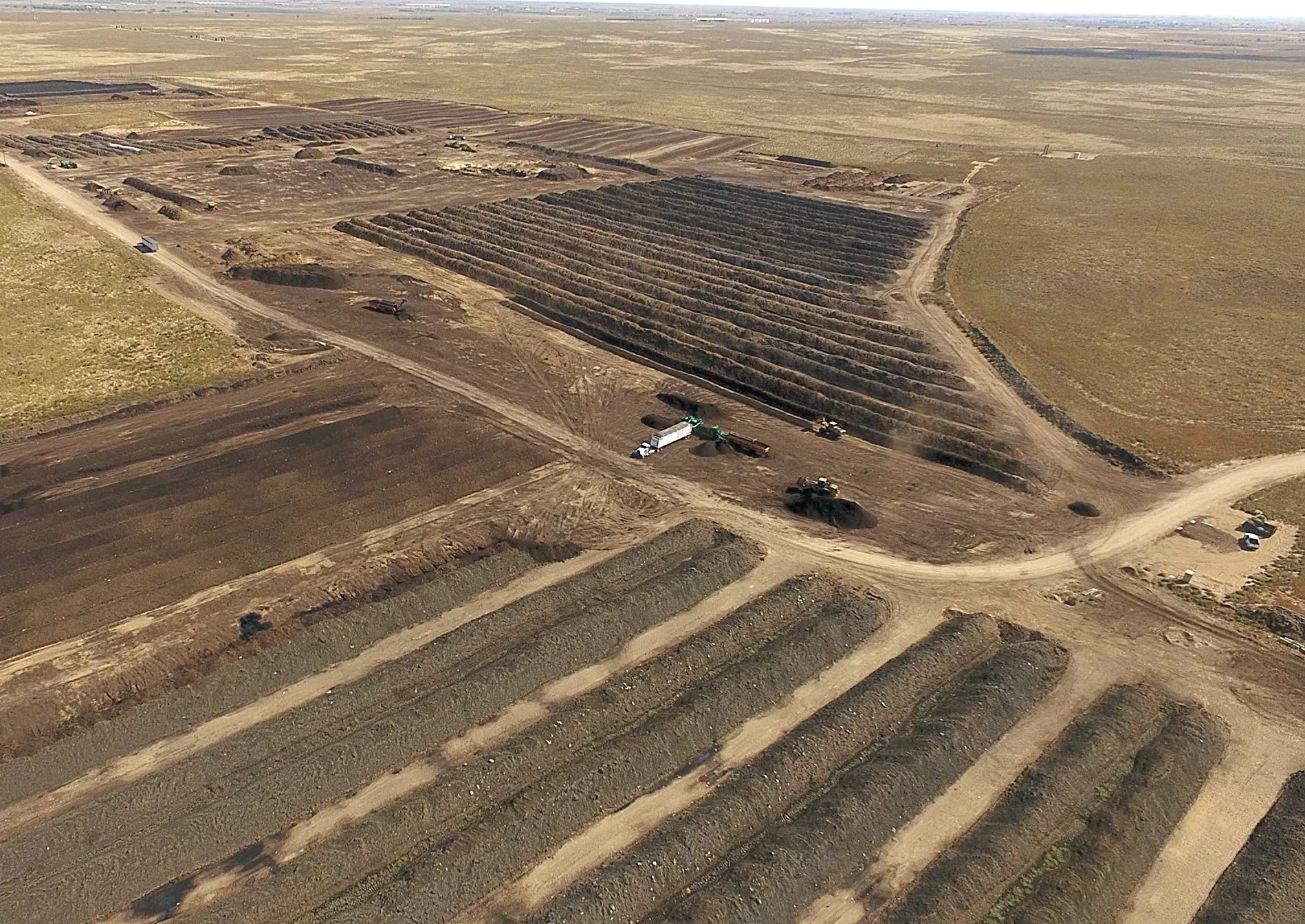
The A1 Organics facility in Keenesburg.
Courtesy of Clinton Sander
Most organic waste that is salvaged in the metro area is currently processed at A1 Organics in Keenesburg, a 425-acre commercial compost manufacturer processing half a million tons of compost annually, fifty miles northeast of downtown Denver. As a result, the compost that CoCo collects must travel fifty miles for processing and generally doesn’t come back to Denver residents – not exactly a closed loop. Most goes to landscaping companies, some to farms, and some to municipalities doing park maintenance.
Over 100 miles of dump trucking are currently required to complete CoCo’s waste cycle. That doesn’t please Fussell or many other people working in sustainability around Denver, who are trying to make composting for large portions of the metro area economically and ecologically sound. If Denver is going to divert 70 percent of solid waste by 2032, as its climate goals suggest, it’s going to need many more facilities to work with. And Compost Colorado could be the first in the city.
“It took us a little while,” says Fussell, but last year, after several attempts, Compost Colorado was awarded a $250,000 grant from the Colorado Department of Public Health and Environment to build Denver’s first compost processing facility in the middle of some of the most historically neglected land in America. But time for CoCo’s closed-loop plan is ticking. The project must be finished in two years, and Fussell has already spent one year getting the right classification to apply for approval. If it fails to make the deadline, Compost Colorado will have to pay back the grant.
“That’s a lot of risk,” Fussell admits. “But it’s what needs to be done. The long-term dream of CoCo has always been to be processing the waste we collect and closing the loop in Globeville. We are crossing our fingers that the government lends us a helping hand and doesn’t cause us too many unnecessary hurdles.”
The CDPHE has a definite interest in seeing more of these facilities built, and the grant program is a part of addressing major barriers to building them. It’s part of the Statewide Organics Management Plan completed in August, which assessed the realities of organic waste management in a state where 95 percent of the waste is reusable. The report listed “location, distance needed to travel, and market surplus” as central obstacles to composting. CoCo’s circular model, urban location and built-in consumer base provide an ideal solution. That tight, localized loop of consumption, waste diversion and reuse is something that Fussell has been working toward from his time as a kid making vermicompost bins in North Carolina.
But now time is short. The city needs to rezone the land to allow for the project, and the Denver Department of Community Planning & Development didn’t even have a zoning category that fits the facility. Industrial agriculture? Retail? Landfill? The word “compost” doesn’t appear in the zoning code.
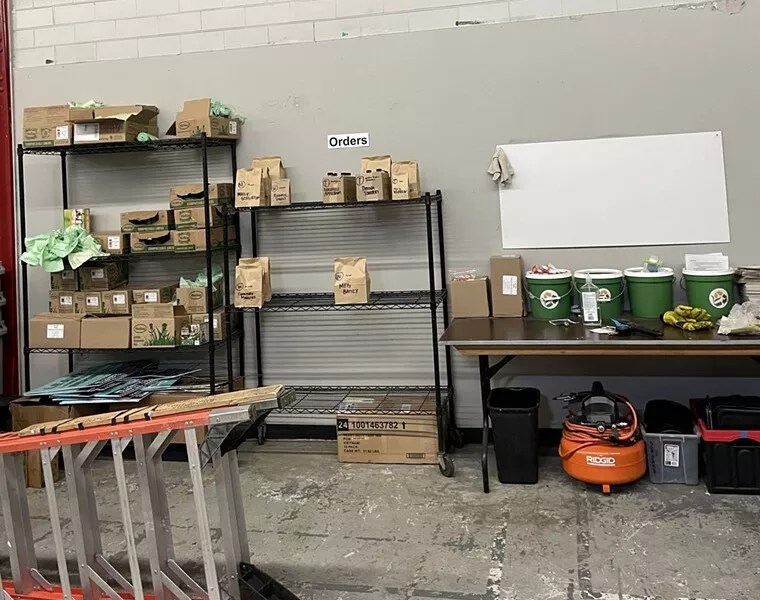
Inside the CoCo warehouse.
Noah Kaplan
Finally last month, CoCo successfully petitioned the city to have its project designated as a recycling facility, the first of its kind. Now Fussell is waiting for his vision plan to be approved by the city, while the CDPHE considers whether to sign off on a certification of designation for a class three composting facility, the most stringently regulated class in the state. With a deadline of late 2023 for final approval, nothing is guaranteed.
Such facilities are far from shoo-ins. Boulder County, where landfill diversion would seem to have plenty of citizen support, tried to get one approved on an easement earmarked for open space and conservation purposes in 2021 but failed to even get to the planning department because of resident pushback and a heated land-use debate. For affluent residents with the time to worry about what their local government might be building in their backyard, composting facilities are apparently something that still belong in someone else’s backyard. As a result, Boulder continues to ship its organic waste over fifty miles to A1 to be processed.
“Finding a site is very difficult for a lot of people – one that is accessible and not fifty miles away,” says Fussell. “You’re not producing additional greenhouse gases for that haul. You are bringing it back to a local location and supporting the local economy.”
With a composting facility at the warehouse, CoCo could also more closely monitor the waste it collects, keeping it free of contaminants.
Mass processing plants struggle with contaminated compost – with plastics, glass and other hazardous materials that end up in the mix of tens of thousands of residential and business buckets, bins and dumpsters. Seven months ago, A1 Organics began rejecting contaminated compost and sending it to the landfill. “This is a very complex challenge,” says Clinton Sander, marketing manager for A1. “The easiest way to remove contamination from the stream is at the smallest volume.”
And the way to get there, he suggests, is by investing in more education, facilities and points of accountability for bin contents. “We need more infrastructure across the state at all levels. We know the opportunities with what we can be diverting from our landfills. We have to have more small facilities, large facilities, and more opportunity to give the compost back,” says Sander.
Fussell wants to build one of those facilities, but he understands the very real concerns. In 2008, his family was embroiled in a lawsuit with a landfill that bordered the farm his grandmother lived on in North Carolina. The landfill hadn’t been lined properly and leaked pollutants, contaminating the land and ecosystems on the farm.
“If not managed properly, there could be odor issues, there could be pest issues, there could be fire issues, or pathogens when the compost isn’t cooked properly,” Fussell acknowledges. “That being said, there are only fifteen composting facilities in the whole state, and that’s not enough.”
“There are only fifteen composting facilities in the whole state, and that’s not enough.”
CoCo could be the sixteenth. But after having gone through so much, Globeville has to be protected from any further environmental hazards, he says. “We are trying to site a waste facility in a community that’s faced a lot of environmental injustice and still faces a lot. Right next to the Platte River. That sounds not cool on paper, right?”
Two blocks away, there is a metal recycling facility on the Platte River. “You walk over there, you’ll see a bunch of mangled cars leaching all their heavy metals right into the river,” Fussell says. Nearby is Alt Recycling, another trash transfer center that leads to “little bits of micro and macro plastics being blown around every day all over Washington Street and into the river,” he adds. A few blocks farther down is Suncor, the embattled oil refinery that’s paid out millions in environmental lawsuits.
“We have all these blatant violations of common sense, whether they are checking the boxes and crossing their t’s or not. Maybe they are. But anyone with eyes and ears and common sense can go to those facilities and say that this is gross, this is not right, I don’t want that going on in my community,” he says.
Fussell is committed to a different kind of industry. “We want to show that a composting facility can be located close to a river and be very safe,” he says. “That a waste facility can be great for the community.”
He and his team have devised a simple plan to do the entire operation in closed mobile containers raised off the ground, isolating the process, and on top of the thick industrial foundation already built for the slaughterhouse. But they find themselves having to help regulators understand their methodology, which adds time, precious time that CoCo – and the planet – can’t afford to waste.
So CoCo is already working with the neighborhood. “We just spread 100 cubic yards of organic fertilizer in the community last month to rejuvenate soils, plant trees and help people beautify lawns, yards and gardens. We even got to fund a community garden here,” Fussell reports.
“The first year of CoCo, I lived in the facility here,” he adds, glancing around at the massive warehouse. He has twelve employees, big responsibilities and a Denver Sustainability Advisory Council meeting on his schedule.
“We are really trying to be a pilot that others look to when it comes to siting organics processing facilities in cities in tight urban environments,” he says. “To show that it’s not this big nasty thing to be afraid of. It can be something that’s regenerative and beautiful, that’s a value add and that gets people access to a great product and builds up that carbon sequestration.”
CoCo is expanding, too. It’s purchased three additional vehicles, including a box truck and a new Rivian electric vehicle that Fussell says he got for a steal. He, like the city, is looking for more drivers.
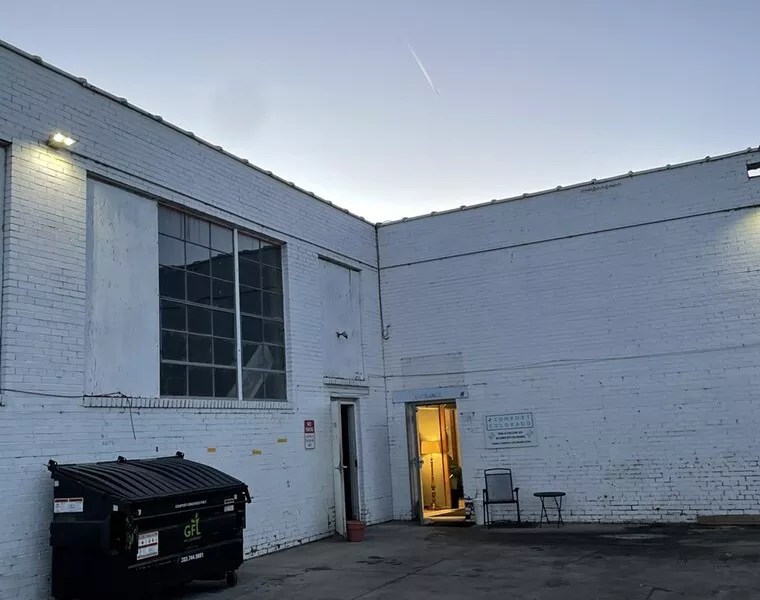
Noah Kaplan
After a day on the road, I’m back at the warehouse, a little messier than before but no worse for wear, a bounty of already cooking compost in tow. The sun is starting to go down behind the evening traffic on the highway, but you can’t hear it from the CoCo property. We tag-team the heavy lifting – hauling and storing thousands of pounds in garbage totes dispensed in small dumpsters that overflow by the time the day is done; there’s a larger dumpster coming this week.
For the waste I’ve collected, this is just the first stop; a truck headed to A1 will be here in the morning. The CoCo crew readies the depot for another cycle, cleaning the rags, stacking the buckets. They are a few thousand pounds closer to closing the loop today than they were yesterday, but there is a lot of work left to do. A Cooper’s Hawk perches by where the vans are parked; a live Phish album plays in the background:
So toss away stuff you won’t need in the end,
but keep what’s important – and know who’s your friend.
So I ask you why, if I’m swimming by,
don’t you see anything you’d like to try?